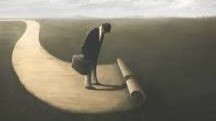
Peter M. Rojcewicz, PhD
Leadership Consultant; Education Management Advisor; Arts Education Specialist; Applied Humanities Mentor; Noetic Learning Theorist; Folklore Belief Materials Scholar; Award-winning Poet
October 13, 2025
We reside in a fractured world, notably described by W.B. Yeats, “Things fall apart, the center does not hold.” Fragmentation is a spiritual ‘illness’ of limited growth that cripples personal and community trust. It makes us vulnerable to the weaponization of disconnection. On the other hand, integrating the shards of a fragmented self and that self with others equally fragmented – including the earth and its other than human life – is the equivalent of ‘health’. In the current state of national affairs, social commentators have noted a “death of soul.” Holderin anticipated the current paradoxical condition, “Where the danger is, there the saving power grows.” Yeats knew, “Nothing can be sole or whole that has not been rent.” The ultimate form of ‘rent’ is the tearing apart of life that is a ‘death’, understood here in its depth psychological sense as a ‘dying’ to and a letting-go of rigid one-sidedness and partial development.
Some say the nation’s soul is under grave attack. Stanley Kunitz understood, “In a murderous time/the heart breaks/and lives by breaking./ It is necessary to go/through dark and deeper dark/and not to turn.” We are challenged not to turn away but to integrate ‘death’ in the personal and collective psyche. Richard Moss noted, “wholeness is both growth and demise in a balance from which the new human/humankind emerges.” Accepting ‘death’ in all fashions as the ostensible transformation of things, we overcome the terror in the heart of a separate, autonomous self. We learn we are not simply a part of a whole, but that we are interconnected wholeness of ongoing beginnings and ends, and that a failure to develop our human completeness means we are vulnerable throughout life to endless splitting, impairment, disease, and acute suffering of identity disintegration. Where there is no acceptance of ‘death’, there are no breakthroughs, only breakdowns. John Keats endlessly pursued ‘soulmaking’ despite the abundant travails of life, “Do you not see how necessary a world of pain and troubles is to school an intelligence and make it a Soul?”
What can we effectively do retain soul under the heavy shadow of pain and troubles of the times? Theodore Roethke clears a path, “In a dark time, the eye begins to see.” What might the eye see amidst the pain of darkness? Healing-centered poets, social tricksters, intellectual outlaws, community-based artists, and indigenous transformative shamans offer us multiple forms of non-violent resistance to attacks against human dignity and freedom. In Portland, Oregon, recently identified by federal officials as a ‘war zone’ in need of police ‘forcing’, armed military were met downtown by citizens donned in colorful costumes as unicorns, gently dancing in the streets. Was that a form of lunacy, or, as in the eyes of Emily Dickinson, “divinest sense to a discerning eye.” Artists and cultural creatives know, after Dickinson, “Demur you’re straightway dangerous and handled with a chain.” And after Roethke, “What’s madness but nobility of soul at odds with circumstance.” If the vital vision and expression of fearless pro-democracy citizens is viewed by questionable authority as ‘dangerous’ to its self-interest based agendas, let us together, even as we stumble and fall, resolutely follow Roethke, “I climb out of my fear. /The mind enters itself, and God the mind,/And one is One in the tearing wind.”
REFERENCES
W.B. Yeats, “The Second Coming”
Friedrich Holderin, “Patmos”
W.B. Yeats, “Crazy Jane Talks with the Bishop”
Stanley Kunitz, “The Testing Tree”
Richard Moss, “The Individual and Collective Levels of Consciousness and Their Relationship to Health-Disease”
John Keats, “Letter to George and Georgina Keats”
Theodore Roethke, “In A Dark Time”
Emily Dickinson, “Much Madness Is Divinest Sense”